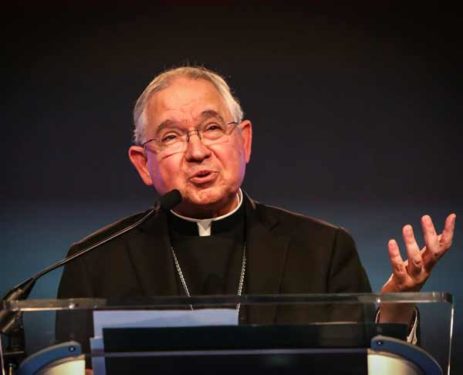
By Christopher White, The Tablet’s National Correspondent
Archbishop José Gomez of Los Angeles, Calif., said Saturday, May 12, that the U.S. is facing a “crisis of identity,” more bitterly divided and anxious than he has ever witnessed, and he called on college graduates “to tell a new story for a new America.”
“I know that many of you feel the way that I do – that our great nation is losing her way,” Archbishop Gomez said, while delivering the commencement address at the Catholic University of America in Washington, D.C.
As the head of the largest and most diverse Catholic diocese in the United States, the archbishop urged graduates to rediscover and tell anew the story of America’s founding, one that has not always been pure, yet one that is still defined by “American holiness and heroism.”
Archbishop Gomez recalled Pope Francis’ 2015 visit to the grounds of the Catholic University of America, where he canonized St. Junípero Serra. Not only did it mark the first time a Catholic had been canonized on American soil, but also it was a bold statement by Pope Francis to cement the legacy of Father Serra as one of America’s founding fathers.
“It is interesting to think: St. Junípero Serra never even saw Washington, D.C.,” Archbishop Gomez reflected. “He was a Hispanic missionary who came up from Mexico to preach and build in California. And he never left there. The United States of America was not even established as a nation until the final years of his ministry.”
Even so, the prelate pointed out, America’s founders, including Father Serra, “dreamed of a nation where men and women from every race, religion and national background could live in equality. As brothers and sisters, children of the same God.”
In order to reclaim that vision, he urged graduates to remember the “mystics and missionaries; martyrs and immigrants; refugees and exiles” that have kept the country’s founding vision alive.
“There are indigenous saints, such as Black Elk, the Lakota Sioux mystic and Catholic catechist. There are freed slaves such as Father Augustus Tolton, our country’s first black priest,” he said.
“The litany of American saints goes on and on, and it includes servants of the poor such as the Creole saint Henriette Delille and Mother Marianne Cope who served the lepers; there are artists and activists such as Dorothy Day and Thomas Merton,” Archbishop Gomez added.
In the same manner in which Pope Francis used his 2015 address to the U.S. Congress to highlight the particular lives of great Americans – Catholic and non-Catholic alike – that have given lived witness to the promise of America, the archbishop added that “the saints I know best are in my Catholic tradition. But there are American saints in every faith tradition, and in every family and every neighborhood.”
Saints of the Everyday
“They are the hidden saints, saints of the everyday,” he continued. “Holy wives and holy husbands, working hard to do what is right, sacrificing for their children; being good friends and good neighbors; serving the poor and working to make their communities stronger.”
Archbishop Gomez said that the story of a “new America” would begin with lives of sacrifice for others.
“America’s founders – the missionaries and the statesmen – they knew this truth,” he said. “They knew that we belong to a story that began long before us, the story of our Creator.”
In a nod to the national debate over immigration, where he has long been among the leading champions of immigrant rights among the U.S. bishops, he added: “They knew that we are born with a dignity and a destiny that can never be denied. No matter who we are. Or where we came from. Or how we got here.”
Archbishop Gomez, who is an adult immigrant to the United States from Mexico, was also conferred an honorary doctorate by the University, for his long-standing advocacy of immigrants and “especially efforts to keep families together and support Dreamers.”
“Dear graduates, now it is your turn to hold these truths and to tell them to a new generation,” he said on Saturday.
In a final summation that wove together Abraham Lincoln, Emma Lazarus, and the Declaration of Independence, the archbishop insisted, “The American story is not over yet. It continues in you and in me.”
“We can still rely on the protection of divine Providence. We can still open our door with confidence to people who are yearning to breathe free. We can still practice a politics with malice toward none and charity for all. We are made for greater things,” he concluded.
